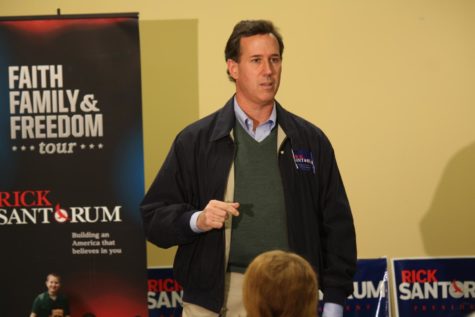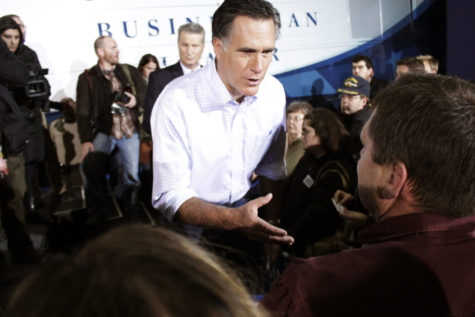Cline: Notes and observations from a caucus-goer
January 9, 2012
I spent three weeks at home during break, primarily searching for the easiest way to coast through each day, yet caucusing was the biggest waste of time. While most of my days were divided between nap time and family time, on the most hyped night of the month I was persuaded into doing my democratic duty.
In 2008, I had the opportunity to participate in my first caucus. Most of my family and fellow classmates crowded into the precinct hubs to cast their vote. Everyone talked it up as something truly unique and fun.
That year, both parties were represented in enormous fashion. Obama, Clinton, Romney and Huckabee, among others, attempted to pull voters across all political aisles. All reports lauded the process and the ability to have first say in the selection of our next president.
Perhaps that was part of the problem this time around. We were stuck with only a handful of candidates from one party. Without the double storylines of candidate versus candidate and party versus party, my first caucus experience lost some of its luster.
Nonetheless, I was ready to do my duty as an American citizen. I looked beyond my own beliefs that the “pure democracy” of America and the theory that every vote matters is just a facade, and I put my support behind the GOP. However, support was about the only thing I did not find for any candidate.
Based on reports from past caucus-goers, I imagined it as a large rally with paraphernalia for each candidate and representatives in the room to speak on behalf of them. Unfortunately it turned into a convoluted mess with no organization or educational value. There was more chaos than a freshman move-in day.
I’m fairly certain I registered, but no one checked identification. I’m fairly certain I was in the correct precinct, but no one directed me where to go. Instead of having representatives speak for each candidate, a few random people said a few sentences for a few candidates. No one spoke for Michele Bachmann, Jon Huntsman or Newt Gingrich. A random college student mumbled his way through a Ron Paul speech, and two overly excited men spoke in favor of Rick Santorum and Rick Perry.
There’s an old adage that goes along the lines of “the loudest 2 percent make 98 percent of the noise,” and that was in effect at the caucuses. A few over-excited constituents piped up at every opening and gave their two cents that were as vague as a Mitt Romney commercial. We gained more education on each contender simply by conversing with the few people at our table. My mother nearly went from knowing almost nothing about Ron Paul to casting a vote for him that night.
Again I was led astray by my visualization of a caucus. The voting took a matter of minutes, but the next hour was dedicated to nonsensical arguments about planks in the party platform and selection of delegates from a group of individuals completely disinterested in volunteering. By this point in time, the night was a waste, but the debating was the icing on the cake.
It may have been that every person in the room but me was old enough to caucus for Calvin Coolidge or that my hometown is heavily Democratic and the few Republicans grew overzealous, but many of the issues mushroomed into dysfunction. Some of the points had merit, such as limiting the perks and payments to state and federal congressmen, but most centered on undoing anything Obama has done or nitpicking at the smallest issues of our national life.
The best thing about the caucuses is that they’re done. It may cast a spotlight on Iowa for a brief period, but no one misses them once they’re gone. I for one will not miss my family’s home phone ringing off the hook on Christmas Eve. When these candidates flock to a state, they cause more of a circus than anything else.
Our first-in-the-nation status should be challenged, and there is truth in the ideal that we do not accurately represent the political leanings of the entire nation. In 1992, Iowa’s own Tom Harkin garnered more than 70 percent of the vote with his home-field advantage; Bill Clinton took home less than 3 percent. In most cases, we are better equipped at weeding out the losers than picking the winners.
Caucusing is not nearly the social and political event we like to think it is. The disorganization and disinterest made a mockery of our esteemed democratic principles. It is more of a selfish act by Iowans to draw attention to our state for a few weeks than a political barometer.








